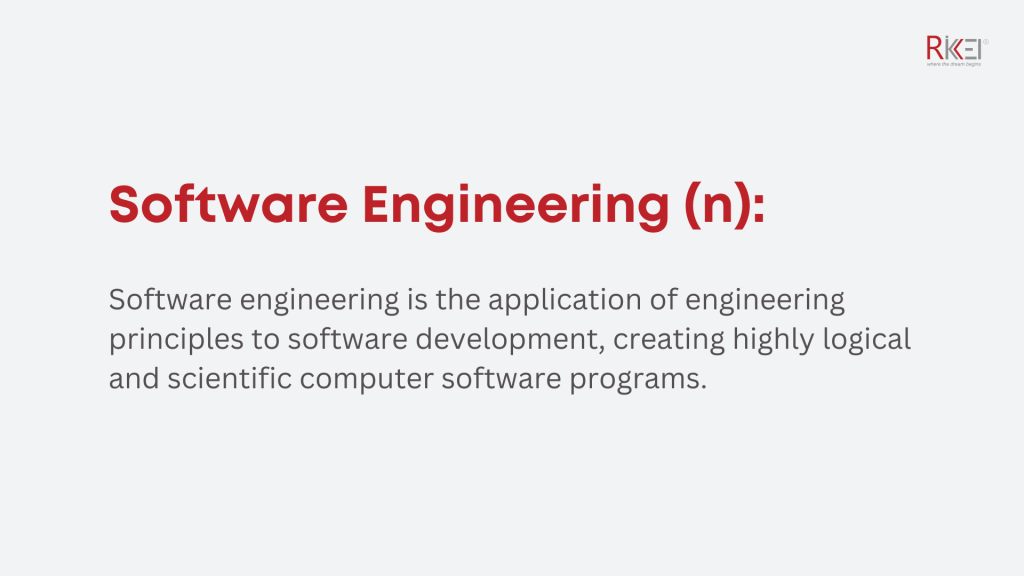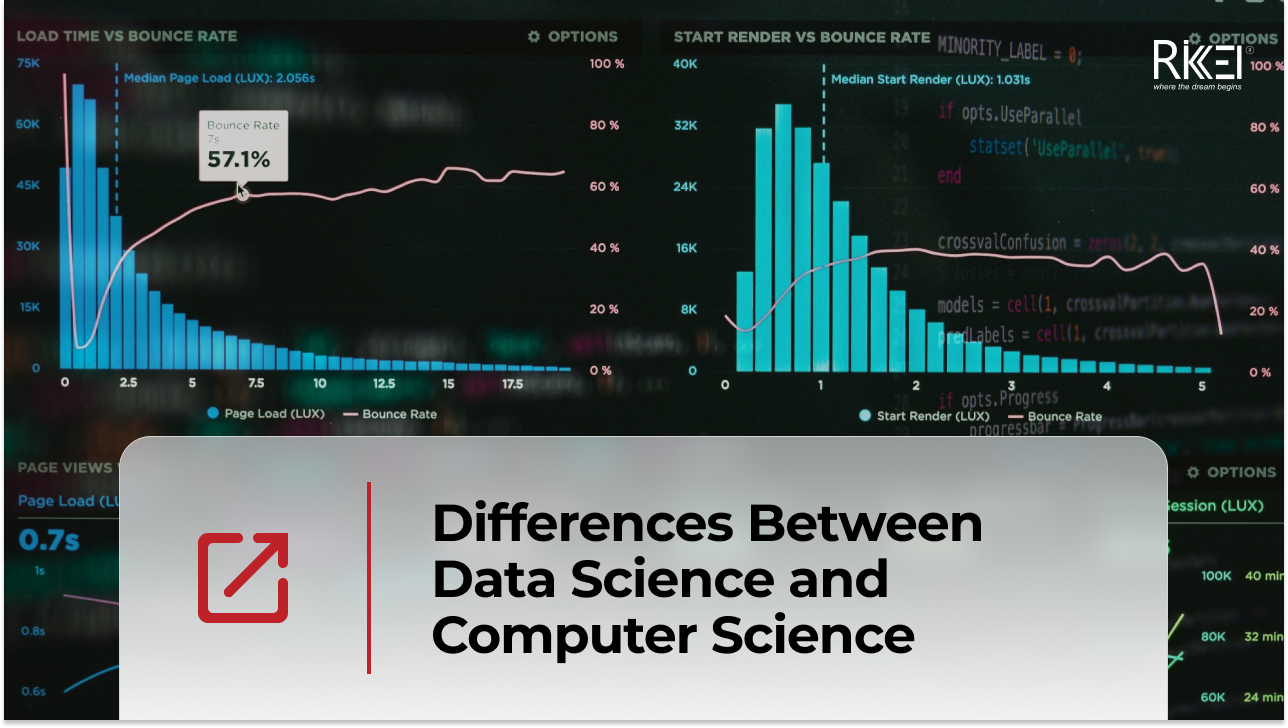Exploring the Different Types of Software Engineering
Contents
The information technology industry is a vast and exciting field, with plenty of roles to explore. Each role requires unique skill sets, making it essential to familiarize yourself with the various types of software engineers to find your perfect match.
In this article, we delve into twelve types of software engineers and the key differences, so you can better understand which career path aligns with your goals.
What is Software Engineering?

Software engineering is the application of engineering principles to software development, creating highly logical and scientific computer software programs. As a software engineer, your responsibilities will include analyzing user needs, setting objectives, collaborating with other engineers and programmers, using math and science to design systems, and consulting on performance interfaces.
The job of a software engineer is diverse and challenging, requiring a mix of hard and soft skills that vary across the industry. However, a fundamental skill required of any software engineer is proficiency in programming languages. These tools are used to create instructions for computers, and the ability to use coding languagesallows software engineers to turn their ideas into functioning commands.
The most commonly used programming languages for software engineers include Java, JavaScript, Structured Query Language (SQL), C++, C#, Python, HTML, and CSS.Those with more specialized skill sets may use lesser-known languages such as Ruby, PHP, Rust, and Swift.
12 Different Types of Software Engineers
Different types of software engineer roles also exist in various engineering functions, and they all have the common goal of ensuring a smooth and seamless user experience for their application.
1. Cloud Architect
Cloud Architects are essential in overseeing cloud-based infrastructure and its operations as more applications and platforms move toward cloud servers. They manage various aspects of cloud computing, including cloud management, migration, and monitoring.
To perform their job effectively, Cloud architects need to possess expertise in networking and data centre technologies. They often specialize in software-defined networking, private line-based networking, load balancers, switches, routing protocols, internet protocol (IP) addressing and wide area network (WAN) connections.
The average salary of a junior cloud architect in the U.S. is around $85,000 per year, while experienced cloud architects can earn an average salary of $125,000 per year.
2. Security Engineer
These professionals, also known as “ethical” or “white hat” hackers, test and analyze software systems to identify any security weaknesses or vulnerabilities. They develop methods, procedures, and systems to improve software security and ensure a seamless user experience.
The average U.S. salary for security engineers is $75,560 per year. To achieve this, security engineers employ various skills and techniques such as reverse engineering, C, C++, Python, and Ruby.
3. Front-End Engineer
A front-end engineer, also known as a web developer, is responsible for developing the user interface (UI) of an application or website. This includes visual design elements like aesthetics and layout, as well as a deep understanding of people and computer software’s behavioral elements.
To ensure compatibility, front-end engineers need to know how to code for various operating systems, browsers, and user devices. They also concentrate on optimizing visual presentation using principles of user experience (UX) design.
The national average salary for a front-end engineer in the USA is around $92,910 per year. Required skills include knowledge of UX and UI frameworks, as well as proficiency in CSS, JavaScript, and HTML.
4. Back-End Engineer
A back-end engineer, is responsible for creating smooth and seamless functions behind the user interface within complex systems. Their focus is on the core logic, design, implementation, scalability, and performance of a system. They mainly create and manage databases, integrate data systems, log systems, and cache systems using Application Programming Interfaces (APIs).
The national average salary for a back-end engineer is $95,307 per year. Required skills include proficiency in programming languages such as Java, C, C++, Ruby, Perl, Python, Scala, and Go.
5. Full-stack Engineer
A full-stack engineer is a software engineer who is skilled in both front-end and back-end development. They possess all the necessary skills to create a fully functional web application, from the user experience to the complex systems behind it. The U.S. average salary for a full-stack engineer is $100,504 per year.
Required skills for full-stack engineers include knowledge of UX and UI frameworks, as well as CSS, JavaScript, HTML, Java, C, C++, Ruby, Perl, Python, Scala, Go, Kubernetes, Docker, Apache Mesos, Jenkins, and the HashiCorp stack (Terraform, Vault, Consul, Nomad).
6. DevOps Engineer
DevOps (development and operations) engineers streamline product development, improvement, and maintenance, as well as facilitating communication between development and operations teams. Using their expertise and methodologies, DevOps engineers ensure efficiency in these areas.
DevOps engineers need to work closely with back-end developers, as their line of job requires familiarity with the processes used to build, deploy, and integrate technologies, like cloud computing services. They are also familiar with cloud storage applications such as OneDrive, GitHub, and Amazon Web Services (AWS).
The U.S. average salary for a DevOps engineer is $115,992 per year. Required skills include expertise in technologies such as Kubernetes, Docker, Apache Mesos, Jenkins, and the HashiCorp stack (Terraform, Vault, Consul, Nomad).
7. Software Testers
To ensure the quality of an application, a software tester is responsible for different types of testing in software engineering, reviewing, evaluating, and writing software. They create automated tests, tools, and techniques to validate that systems are functioning properly, identify mistakes, and work to address them. The primary goal of software testers is to ensure that the software is of high quality before delivery to the end-user.
In order to do their jobs well, testers must be well-efficient with different testing tools. The national average salary for this role is $67,361 per year.
8. Software Development Engineer in Test (SDET)
The role of SDET is often mistaken for QA Engineer or Software Engineer in Test, and the terms are sometimes used interchangeably. However, SDET is a combination of both Development and Testing, and SDET developers are well-suited for testing many types of software engineering skills. They carry out software engineering tests and also tests for development.
Because they rely heavily on testing to do their jobs, SDETs must have a firm knowledge of testing software. Furthermore, they earn about the same paycheck annually as QA Testers.
9. Data Engineer
Data engineers are responsible for tasks such as statistical analysis, data visualization, machine learning, and predictive modeling, providing important metrics that can guide product development and meet the needs of the business.
Technical skills required for this role include SQL, R, and Python. The average national salary for this position is $102,139 per year.
10. Video Game Programmer
The game programmer plays a critical role in the development of video games, responsible for creating and designing the software that brings these games to life. This complex task involves a wide range of technical skills and knowledge, including the assembly of platforms and engines that will drive the game’s performance, as well as writing custom code to meet the unique and often complex requirements of modern video games. To accomplish this, game programmers must be adept at utilizing programming languages and tools, as well as collaborating with other team members, including game designers, artists, and testers, to ensure that the final product meets the high standards of the industry and the expectations of players. In short, game programmers are the architects of the digital worlds that millions of people around the world enjoy every day, and their work is crucial to the success of the gaming industry as a whole.
The gameplay experience is entirely created by game developers, who use skills such as DirectX, OpenGL, Unity 3D, WebGL, C, C++, Java, Swift, JavaScript, and HTML5. The national average salary for a video game designer is $95,328 per year.
11. CRM Project Manager
CRM (Customer Relationship Management) managers’ main responsibility is working with systems that collect user and consumer data to create programs that provide valuable metrics for a given program. They improve customer satisfaction or sales by optimizing the tools used by customer support and sales representatives.
Some of the skills required for this role include expertise in SAP, Salesforce and SharePoint. The average salary for a customer relationship management (CRM) project manager or developer is $85,483 per year.
12. Software Integration Engineer
Software Integration Engineers, also known as embedded systems developers, are responsible for bringing coding power to program hardware, such as consumer devices, home security alert systems, electronics, interfaces, real-time systems, and serial data transmissions. This role has become more important in the age of smart devices and the Internet of Things.
The national average salary for software integration engineers, is $108,392 per year. Skills required for the position include knowledge of C, C++, Assembly, Java, as well as proprietary technologies, frameworks, and toolkits.
Rikkeisoft – A Potential Partner for Software Engineers

Here at Rikkeisoft, we also provide world-leading software engineers for whatever needs you may have. Rikkeisoft offers a complete website development service including Web Frontend Design, Backend Development, Custom Web Application and SaaS Applications Development. You can rely on our technology experts to create a website that meets your vision.
We provide end-to-end testing solutions tailored to your company projects, ensuring optimized results. Additionally, we conduct quality assurance audits and provide you with a detailed report of any identified issues and comprehensive instructions on how to resolve them.
Conclusion
Although the term ‘software engineer’ indicates a particular type of software engineering job, there’s more to it than just that. Eachtype of software engineers requires a distinct skill set, along with individual interests that may direct one towards a particular career path. Therefore, when selecting a software engineering role, it’s important to consider personal skills and interests.
More From Blog

August 8, 2024
Data-Driven Product Development: Strategy To Drive More Sales
As a business owner, you want your products or services to be well-received upon launch. The most effective way to create a product that satisfies a broad range of customers is to gain insights into their needs and behaviors from the outset. The key lies in data-driven product development, a strategy that many companies have […]

August 8, 2024
7 Steps To Establish A Data-Driven Governance Program
While data-driven approaches significantly benefit organizations in various ways, failure to govern the huge data sets will hurt your business even more. Effective data management also ensures data quality and security. That’s why there is an increasingly high demand for data-driven governance programs. Continue reading for a detailed guide! What Is Data-Driven Governance? Surprisingly, many […]

August 8, 2024
Data-Driven Business Transformation: 7 Steps To Follow
Data empowers businesses to make well-informed decisions in different departments, like marketing, human resources, finance, and more. As a business owner, you should also employ data-driven approaches to skyrocket productivity and efficiency. If you are still new to this concept, scroll down for an in-depth guide on data-driven business transformation. What Does A Data-Driven Business […]

August 8, 2024
Data-Driven Security: Transforming Protection Through Analytics
Cybersecurity was once an afterthought for most organizations. But in today’s digital landscape, it has become mission-critical. With this transformation has also come a shift in how security decisions are made. Rather than relying solely on intuition and tradition, leading organizations are embracing data-driven strategies. By using metrics and insights around threats, vulnerabilities, and more, […]

August 8, 2024
Differences Between Data Science and Computer Science
Data Science and Computer Science are distinct fields overlapping in certain areas but have different focuses and objectives. The article below will help you clearly understand the differences and the close connection between the two fields. What is Data Science? Data Science is an interdisciplinary field that combines scientific methods, processes, algorithms, and systems to […]

August 8, 2024
How Real-Time Data Analysis Empowers Your Business
In today’s fast-paced business landscape, the ability to quickly make data-driven decisions has become a key differentiator for success. Real-time data analysis, the process of analyzing data as soon as it’s generated, has emerged as a powerful tool to empower business across industries. By leveraging real-time data analysis, organizations can gain timely and actionable insights, […]

